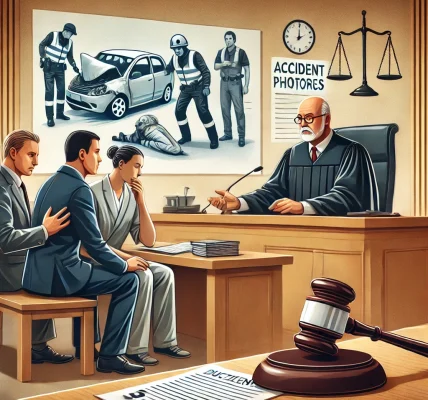Suffering a personal injury due to someone else’s negligence can be life-altering, and securing fair compensation is crucial for covering medical expenses, lost wages, and emotional distress. However, many claimants unknowingly make mistakes that reduce their settlement amount. This guide will provide essential strategies to help you maximize your personal injury compensation while ensuring that your legal rights are protected.
1. Seek Immediate Medical Attention
One of the most critical steps in a personal injury claim is getting medical treatment right away. Insurance companies and courts consider medical records as strong evidence of injury severity and required treatments.
Why It Matters:
- Delayed medical attention can weaken your claim, as insurers may argue that your injuries are not serious or were not caused by the accident.
- A well-documented medical history strengthens your case.
Pro Tip:
- Follow your doctor’s instructions and attend all follow-up appointments to show the seriousness of your injury.
2. Gather Strong Evidence
Solid evidence can significantly impact your compensation. Document everything related to your accident and injuries.
Key Evidence to Collect:
- Photos/Videos: Capture the accident scene, injuries, and any contributing factors (e.g., wet floors, damaged sidewalks, vehicle damage).
- Witness Statements: Collect contact information and testimonies from people who saw the accident.
- Medical Records & Bills: These prove the extent of your injury and related expenses.
- Police Reports: If law enforcement was involved, obtain a copy of the official accident report.
3. Avoid Giving Statements to Insurance Adjusters Without Legal Guidance
Insurance companies are not on your side—they aim to minimize payouts. Adjusters may use your statements against you to reduce your claim.
What to Avoid:
- Admitting fault or downplaying your injuries.
- Providing recorded statements without consulting a lawyer.
- Accepting early settlement offers without evaluating long-term costs.
Best Approach:
- Politely decline to discuss details without legal representation.
- Let your attorney handle negotiations.
4. Calculate Full Damages Before Accepting a Settlement
Many victims settle too early without understanding the full extent of their damages. Consider both economic and non-economic damages.
Types of Compensation You May Be Entitled To:
- Medical Expenses: Hospital bills, surgeries, therapy, and future treatments.
- Lost Wages & Future Earnings: Compensation for work missed due to injuries.
- Pain & Suffering: Emotional distress, trauma, and reduced quality of life.
- Property Damage: Repair or replacement costs for damaged personal property.
- Punitive Damages: In cases of extreme negligence, additional compensation may be awarded.
Pro Tip:
- Work with an attorney to estimate long-term costs before agreeing to any settlement.
5. Do Not Post About Your Case on Social Media
Anything you post online can be used against you. Even an innocent picture or comment can be misinterpreted by insurance companies.
Best Practices:
- Avoid discussing your injury or legal case on social media.
- Set your accounts to private but be cautious—opposing parties may still access your content.
6. Hire an Experienced Personal Injury Lawyer
Having legal representation can significantly increase your compensation. Lawyers understand legal procedures, deal with insurance companies, and build strong cases.
Benefits of Hiring a Lawyer:
- Expertise in negotiating fair settlements.
- Knowledge of legal loopholes that can benefit your claim.
- Ability to take the case to court if necessary.
When to Hire a Lawyer:
- If your injuries are severe or require long-term treatment.
- If the insurance company disputes liability or offers a low settlement.
- If multiple parties are involved in the accident.
7. Be Patient and Prepared to Negotiate
Insurance companies often start with lowball offers, hoping claimants accept less than they deserve. Patience and strong negotiation skills can lead to a better settlement.
Negotiation Tips:
- Never accept the first offer without reviewing it carefully.
- Highlight evidence proving liability and damages.
- If necessary, be ready to take the case to court to secure fair compensation.
8. Keep a Personal Injury Journal
Maintaining a journal documenting your injuries, pain levels, medical appointments, and emotional struggles can serve as valuable evidence in your claim.
What to Include:
- Daily pain levels and physical limitations.
- Emotional distress and anxiety caused by the injury.
- Any activities you can no longer perform due to the accident.
9. Follow All Legal Deadlines
Every state has a statute of limitations, which sets a deadline for filing personal injury claims. Missing this deadline can result in losing your right to compensation.
What to Do:
- Consult an attorney to understand your state’s filing deadlines.
- File your claim as soon as possible to avoid delays.
10. Consider Future Expenses Before Finalizing Your Claim
Many injury victims focus on immediate expenses without considering long-term costs. A well-planned settlement should cover future medical treatments, potential surgeries, therapy, and lost earning potential.
Pro Tip:
- Work with medical and financial experts to estimate future costs accurately.
- Avoid quick settlements that do not account for long-term damages.
Final Thoughts
Maximizing compensation in a personal injury claim requires strategic action, strong evidence, and skilled negotiation. By following these steps, you can strengthen your case and increase your chances of receiving the compensation you deserve.
If you or a loved one has suffered a personal injury, consulting a qualified personal injury attorney can make a significant difference. They can guide you through the legal process, protect your rights, and ensure you receive fair compensation for your injuries.
Don’t settle for less than you deserve—take the right steps to maximize your personal injury claim today!




